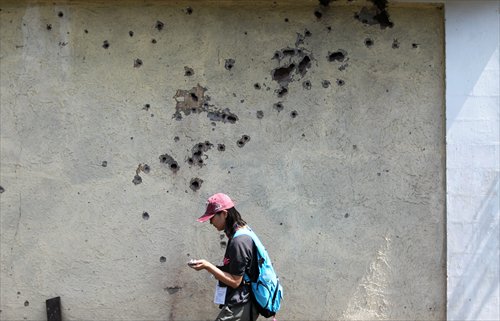HOME >> CHINA
We were there
Source:Global Times Published: 2014-12-29 20:03:01

Global Times reporter Yang Jingjie walks past a bullet-marked wall in an urban battleground in Donetsk, eastern Ukraine, on July 28, 2014. Photo: Cui Meng/GT
The vibrant blogosphere, social media and innovations like crowd sourcing have transformed news coverage. The trend is increasingly clear in 2014. Feeling the challenges of the so-called citizen journalism, we are reassured by the fact that the public is still hungry for quality coverage from professional reporters. The need is even more desperate in the past year when the world has seen such upheavals that the end can't come soon enough.
As journalists at a national newspaper, we are never satisfied with the ill-informed commentaries all over the Internet. Our job is to go to places that ordinary people cannot or dare not reach, look into things under the surface, talk to people involved in an event, listen to well-informed people explaining how and why things happen and what can be done to help so as to find out the truth behind hearsays.
As an opinion piece in the Christian Science Monitor once pointed out, citizen journalism can be as appealing an idea as "citizen dentistry," we also believe our pushy, daring, diligent and deep-thinking reporters are irreplaceable in an era when superficiality and sensationalism have become the norm and depth and nuanced reporting a rarity.
In the past year, our reporters have been put in various situations where emotions are running high - the turmoil in Crimea and Donetsk, the volatile suburbs of Kashgar, the shouting and hustling at Occupy Central protest scenes in Hong Kong and so on. They have escaped bullets, pepper sprays and numerous unknown dangers that marked a tumultuous 2014.
It is also natural that the reporters have experienced doubts, pains and even traumas in those extreme situations when the best and worst parts of humanity were presented starkly before their eyes. However, their feelings are professionally concealed in the stories for the sake of objectivity. I came, I saw, and I reported - they shelved all the emotions and let the readers judge. Lots of times when they were talking about what they had gone through in a very casual way, the editors thought it might be more absorbing to the readers if they were also told about that part.
Now we have this special supplement dedicated to our own reporters. In it the readers will find how a Hongkonger working with a mainland media outlet was confronted by opposing sides involved in the protests that demanded greater autonomy from Beijing; how a reporter struggled to figure out the root cause of different views on history when she revisited her peers in Japan who had joined a student exchange program with her years ago and why the pictures in the center struck our photographers most. All the articles in this special issue are written with a personal touch so that readers might get a glimpse of what happened behind the stories and all the emotions and struggles reporters chose not to tell in normal reporting.
Posted in: In-Depth